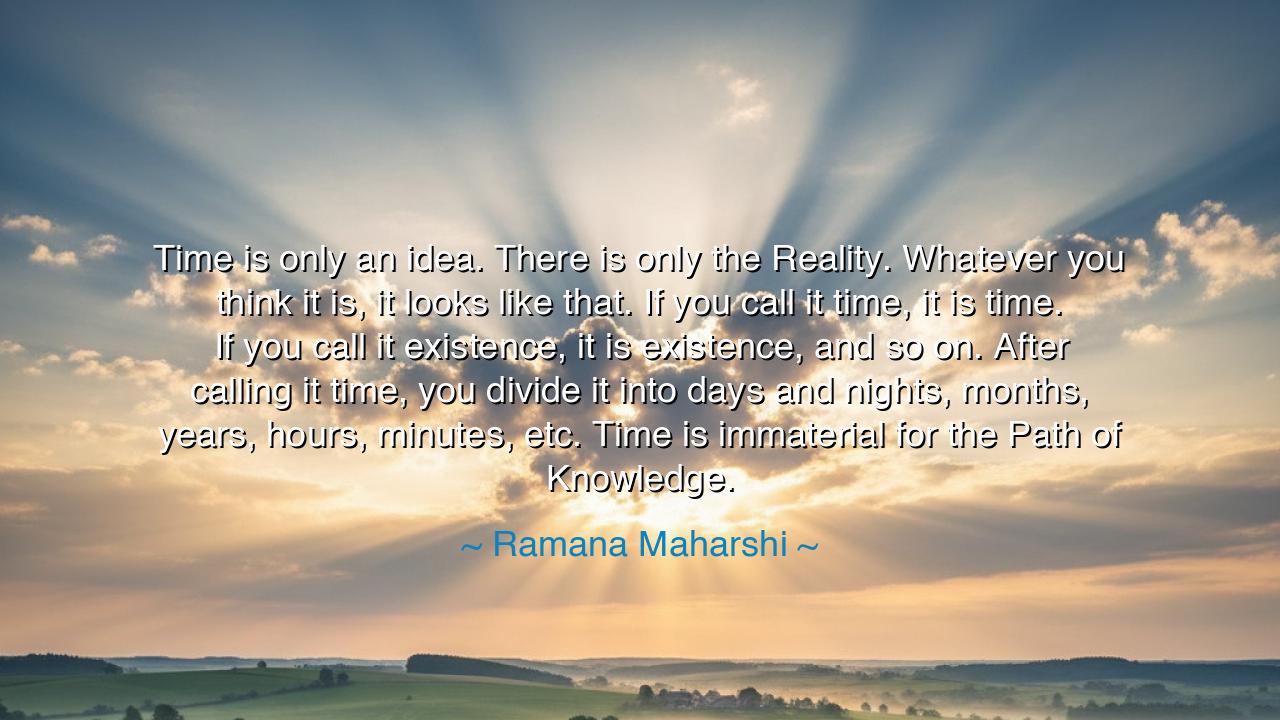
Time is only an idea. There is only the Reality. Whatever you
Time is only an idea. There is only the Reality. Whatever you think it is, it looks like that. If you call it time, it is time. If you call it existence, it is existence, and so on. After calling it time, you divide it into days and nights, months, years, hours, minutes, etc. Time is immaterial for the Path of Knowledge.






Ramana Maharshi, the silent sage of Arunachala, revealed to seekers a vision that transcends the ticking of clocks and the shadows of sundials when he declared: “Time is only an idea. There is only the Reality. Whatever you think it is, it looks like that. If you call it time, it is time. If you call it existence, it is existence, and so on. After calling it time, you divide it into days and nights, months, years, hours, minutes, etc. Time is immaterial for the Path of Knowledge.” In these words he stripped away the illusion that binds the human mind: that time is absolute. Instead, he pointed to the higher truth that beyond hours and years lies the eternal Reality, unbroken and whole, which the seeker of knowledge must discover.
The ancients, too, wrestled with this mystery. The Greek philosopher Heraclitus said, “Time is a child playing, moving pieces in a game.” And Augustine, centuries later, confessed that he knew what time was until someone asked him to explain it. The sages of India went deeper still, declaring that past, present, and future are but movements of thought within the eternal Now. Ramana Maharshi stands within this lineage, reminding us that time is an idea, a construction of the human mind, useful for ordinary life but irrelevant for the soul that seeks liberation.
To understand, one must see how the mind makes divisions. We measure days and nights, hours and minutes, not because the universe demands it, but because we crave order. A sunrise and a sunset become “today” and “tomorrow.” A heartbeat becomes a “moment,” and many moments we call a “life.” But the sun does not know of hours, nor does the mountain know of days. The river flows without calendar, and the stars burn without clocks. It is we who divide the indivisible, we who give names to the nameless. Ramana’s teaching is that the Path of Knowledge requires us to see beyond these names, to rest in the eternal ground that simply is.
Consider the story of Einstein, who, through science, reached a truth the sages had long whispered: that time is relative. A clock on a moving ship ticks slower than one on shore. Time bends with gravity, stretches with speed. For Einstein, this was physics. For Ramana, it was philosophy. Both converged on the same insight: time is not ultimate. It is a lens, a perspective, not the bedrock of reality. And the wise must not cling to it if they would know the eternal.
What then is the lesson for the seeker? It is that clinging to the idea of time binds us to regret of the past and fear of the future. We say, “I wasted my years” or “I fear what is to come.” But if time is only an idea, then regret and fear dissolve, and only the present Reality remains. This is the secret of freedom: to awaken to the Now, where knowledge shines clear and the self is revealed.
Practical action lies in stillness. When you feel chained by the ticking of the clock, pause. Breathe. Ask yourself: What is this moment, if I do not call it time? Sit quietly, letting thoughts of past and future drift away. Read, meditate, walk in nature—anything that dissolves the illusion of hours. In those moments you will taste what Ramana meant: the eternal ground beneath time, the existence that simply is.
Thus, children of tomorrow, remember the sage’s words: time is only an idea. Do not be enslaved by calendars and clocks, nor let your life be ruled by fear of endings. Seek instead the Reality that underlies all appearances. Walk the Path of Knowledge, where days and years dissolve into the timeless truth of your own being. And when you rest in that truth, you will find that eternity has always been here, waiting for you in the stillness of the Now.






AAdministratorAdministrator
Welcome, honored guests. Please leave a comment, we will respond soon